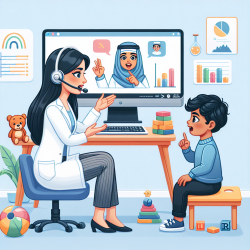Understanding Unpaid Work Roles During COVID-19: Insights for Practitioners
The COVID-19 pandemic has redefined many aspects of daily life, including the dynamics of unpaid work within households. The study "Understanding the unpaid work roles amongst households, during COVID-19" provides valuable insights into these changes. As practitioners dedicated to creating positive outcomes for children, understanding these shifts can help us support families more effectively.
Key Findings from the Study
The study, which surveyed 1,847 participants globally, highlighted several predictors of changes in unpaid work roles during the pandemic. These include marital status, number of household members, age, number of dependent children, and gender. Interestingly, the study found that women, particularly those in relationships with dependent children, experienced significant increases in unpaid work roles.
Implications for Practitioners
For speech-language pathologists and other child-focused practitioners, these findings underscore the importance of considering family dynamics when planning interventions. Here are some actionable insights:
- Recognize the Burden: Acknowledge the increased unpaid work roles that families, especially mothers, are shouldering. This awareness can guide empathetic and realistic goal-setting in therapy.
- Flexible Scheduling: Offer flexible scheduling options for online therapy sessions to accommodate the varied and often unpredictable demands on families.
- Family-Centric Goals: Develop goals that involve the family unit, recognizing that family members are integral to the child's progress.
- Support Networks: Encourage the creation or strengthening of support networks among families to share responsibilities and reduce individual burdens.
Encouraging Further Research
While this study provides a comprehensive overview, further research is essential to explore the nuanced impacts of these changes. Practitioners are encouraged to engage in or support research that delves into:
- The long-term effects of increased unpaid work on family dynamics and child development.
- The role of cultural and socio-economic factors in shaping unpaid work roles.
- Effective strategies for balancing paid and unpaid work in the context of ongoing remote work trends.
By understanding and addressing these complex dynamics, we can better support families and create environments where children thrive.
To read the original research paper, please follow this link: Understanding the unpaid work roles amongst households, during COVID-19.










